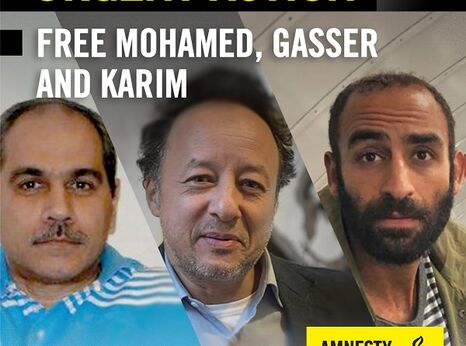Human rights defender ill-treated in solitary

Please note that we do not have an email address for the main target. Please download the full UA below to find additional targets that you can email.
On 15 November, a heavy armed security force arrested Mohamed Basheer from his home and detained him incommunicado at a security facility of the National Security Agency (NSA) for 12 hours, where he was questioned while blindfolded without a lawyer about EIPR’s work including the recent meeting with diplomats. He was then transferred to the Supreme State Security Prosecution (SSSP), which ordered his pretrial detention for 15 days. On 18 November, security forces arrested Karim Ennarah from the beach resort of Dahab, South Sinai, where he was on vacation. They seized his phone, laptop and other belongings and detained him incommunicado at an undisclosed location for 24 hours before bringing him before the SSSP, where he was questioned about his work including on conditions of detention and the death penalty. On 19 November, security forces arrested Abdel-Razek from his home in Cairo. Hours later, he was questioned by the SSSP, who ordered his pretrial detention for 15 days. On 23 November, he was questioned again by the SSSP before being returned to prison, where he is held in solitary confinement. Amnesty International has previously documented cruel and inhuman detention conditions in small and dark cells used to hold detainees with political profiles in solitary confinement with the apparent aim of punishing criticism of the authorities, which in some cases amounted to torture.
Prosecutors detained all three in Case 855/2020 pending investigations on charges of “joining a terrorist group", “spreading false news” and "misusing social media”. Mohamed Basheer was also questioned about “committing a crime of funding terrorism”. The three of them were added to Case No. 855/2020 SSSP, which involves investigations over unfounded terrorism-related charges against prominent detained human rights defenders and journalists, including Mahienour el-Masry, Mohamed el-Baqer, Solafa Magdy and Esraa Abdelfattah. Amnesty International has extensively documented how the SSSP use prolonged pre-trial detention over unfounded terrorism related charges to detain opponents, critics and human rights defenders for months and years without trial.
Patrick George Zaki, an EIPR gender rights researcher, remains detained pending investigations by the SSSP over unfounded “terrorism”-related charges since his arrest in February 2020. On 22 November, his pre-trial detention was extended by another 45 days.
Ambassadors from Germany, France, Belgium, Denmark, Finland, Italy, the Netherlands, Spain, and Switzerland as well as Chargés d’Affaires of Canada, Norway, and Sweden, the deputy ambassador of the United Kingdom and representatives from the European Commission in Cairo attended the meeting at EIPR’s premises on 3 November. Diplomats and the EIPR shared photos of the meeting on social media on 8 November. Officials at the NSA and SSSP prosecutors questioned the detained EIPR staff about their work including the meeting with diplomats.
This campaign is the latest in a string of attacks on NGOs since the 2011 raid and prosecution of staff from five international organizations, known as Case 173, or Egypt’s “foreign funding case”. In 2013, 43 foreign and Egyptian staff were convicted on charges of operating unlawfully and receiving foreign funding without authorities and sentences to prison terms. In a retrial, a Cairo Criminal Court acquitted all defendants in 2018, but criminal investigations under “Case 173” continue against local civil society groups. As part of the case, EIPR’s founder Hossam Bahgat has been under a travel ban since 2016 and his assets have been frozen. At least 30 other human rights defenders are banned from travel and nine have their assets frozen.
The Egyptian Initiative for Personal Rights (EIPR) was founded in 2002. The organization uses research, documentation, legal aid, strategic litigation and advocacy in its work on civil liberties, economic and social rights and criminal justice. Its work includes reporting on the rights of religious minorities in Egypt, documenting sectarian violence, representing members of the LGBT+ community facing prosecution and advocating on mental health law. EIPR is one of the few human rights organizations working on environmental justice in Egypt. EIPR’s recent work included publications on the alarming rise in executions in Egypt in recent months, on the need to ensure equitable access to COVID-19 vaccines; and on the protection of survivors and witnesses of sexual violence.